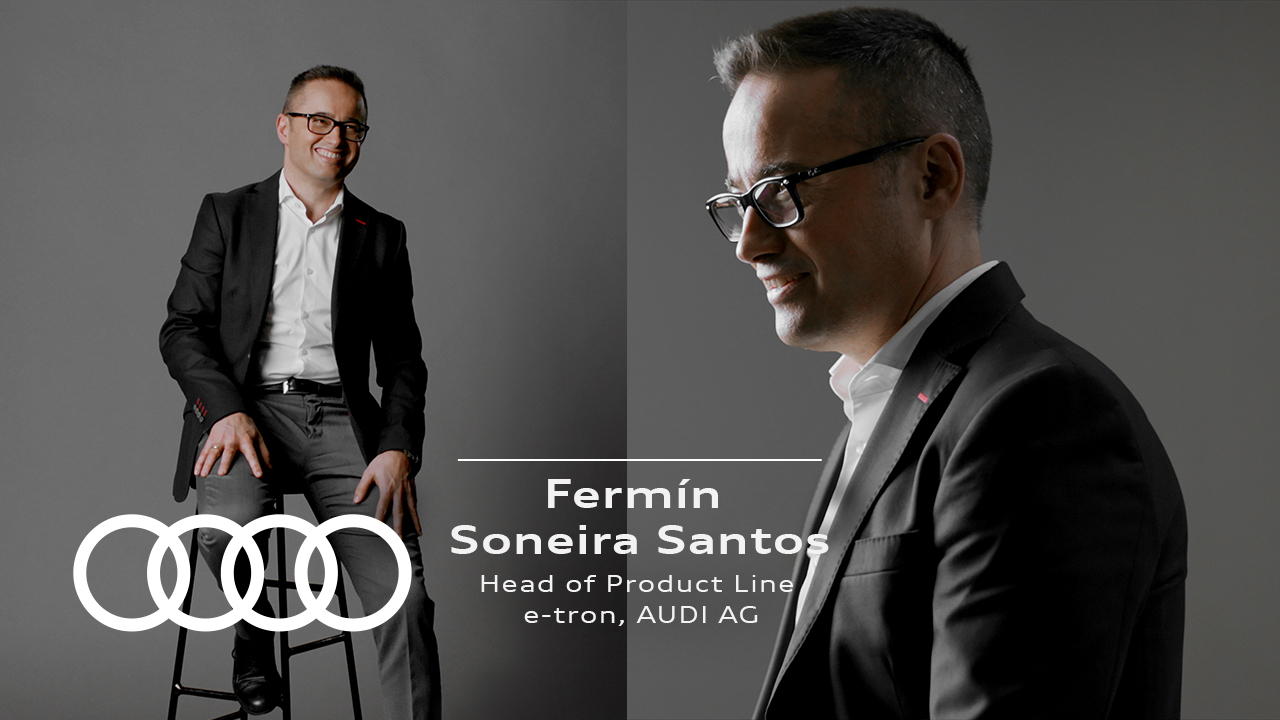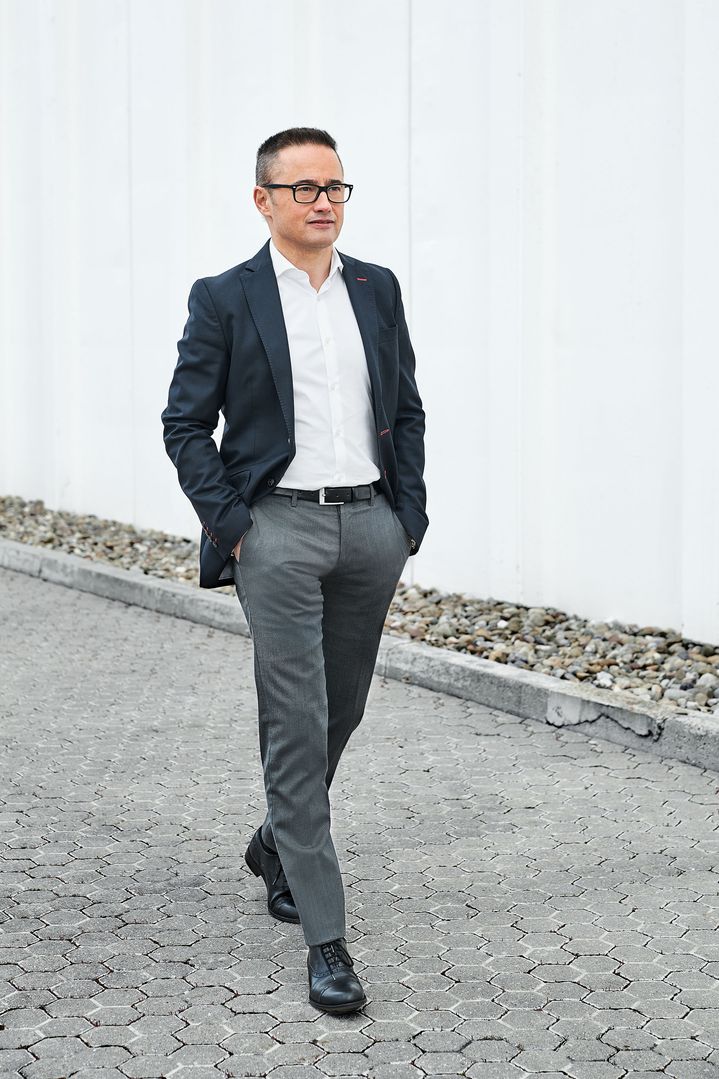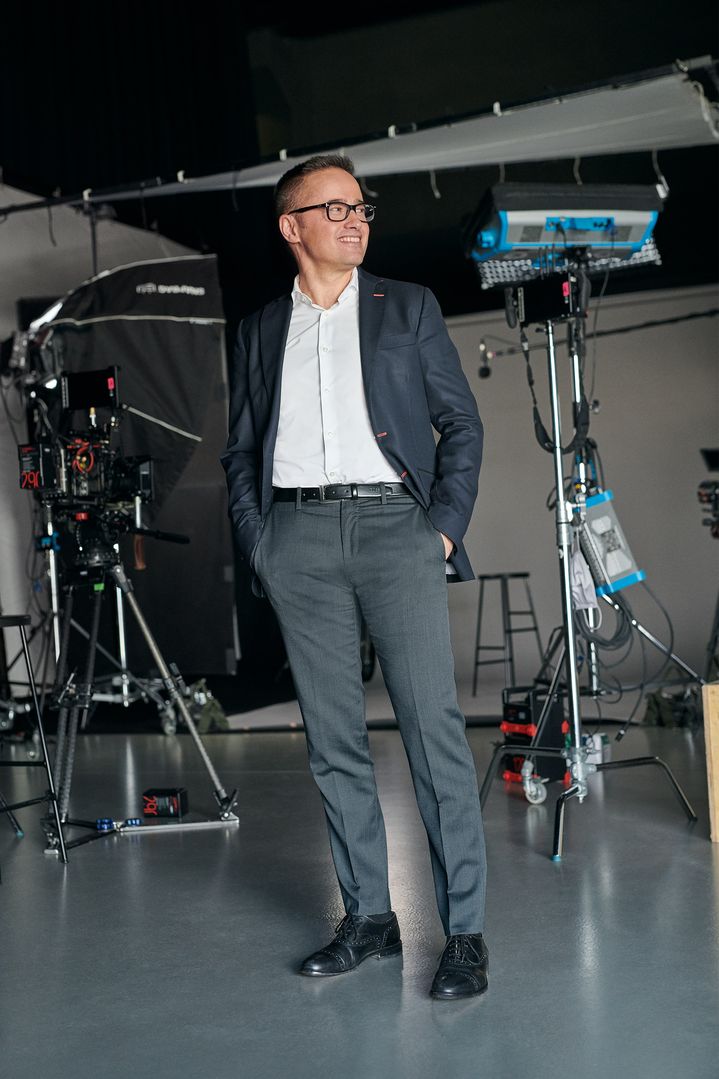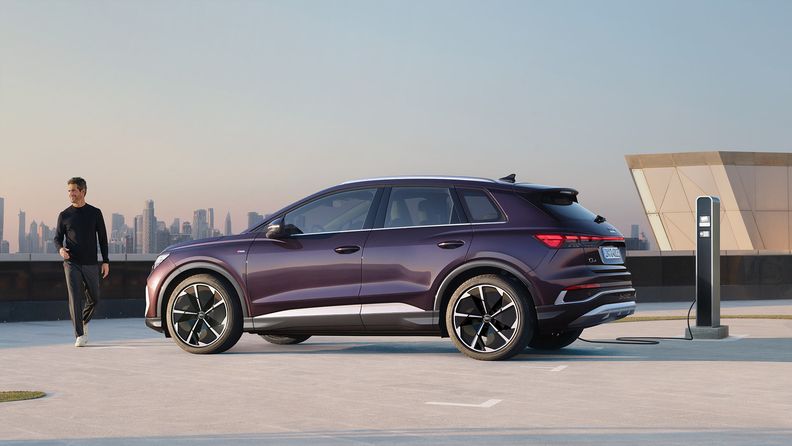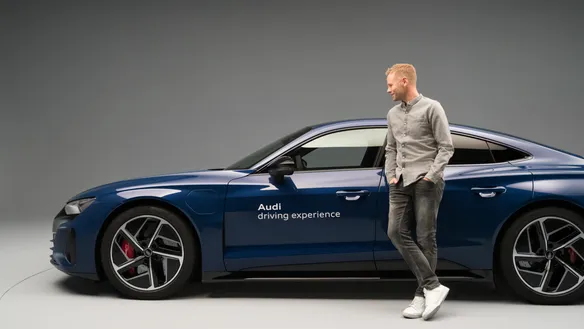“Progress changes our world for the better”

Fermín, what exactly is your role at Audi?
I am responsible for one of four series at Audi. Internally, it is called R3. It comprises three electric model series: the Audi e-tron and e-tron Sportback, which are already on the road, the Audi Q4 e-tron, which is launching now, and the Q4 Sportback e-tron, which will come out soon after. In the future, a third platform for additional electric vehicles, which we are currently developing in cooperation with Porsche, will be added.
That means you are directly involved in shaping the future of our mobility. An exciting thought, isn’t it?
Yes, absolutely. That really is the case with electromobility and our electric vehicles. I find it incredibly exciting to be responsible for those cars and to help shape that change. It’s about more than a car. It’s about transforming an industry for the future.
How would you describe what is special about electric vehicles to someone who has no idea about electromobility?
My first recommendation would be to just drive one. Our studies show that customers who have switched to an electric vehicle no longer want to switch back to a combustion engine. Many are surprised by the performance of electric vehicles. The acceleration from 0 to 100 kmh is, quite simply, very impressive and virtually digital, thanks to the immediately available torque of the electric motor. You feel like you’re driving a very sporty vehicle. On the other hand, it is of course very quiet and comfortable, which makes driving an electric vehicle quite a relaxed experience. And at the same time, you’re doing the right thing for the environment: emission-free driving.
That essentially applies to every electric vehicle. What makes the Audi Q4 e-tron so special is the overall concept of the Audi design, the excellent quality, and an interior that offers as much space in the back seats as an Audi Q7. Then there are the technical innovations, such as the headlights with selectable daytime running lights or the head-up display with augmented reality. Design, quality, and Vorsprung durch Technik: the epitome of Audi DNA in a compact electric SUV.
Audi Q4 e-tron: Power consumption (combined) in kWh/100 km: 19.5–16.2CO₂ emissions (combined) in g/km: 0CO₂ emission class: A
Audi Q4 Sportback e-tron: Power consumption (combined) in kWh/100 km: 18.9–15.6CO₂ emissions (combined) in g/km: 0CO₂ emission class: A
Stated specifications not applicable to all markets.
Audi Q4 e-tron: Power consumption (combined) in kWh/100 km: 19.5–16.2CO₂ emissions (combined) in g/km: 0CO₂ emission class: A
Audi Q4 Sportback e-tron: Power consumption (combined) in kWh/100 km: 18.9–15.6CO₂ emissions (combined) in g/km: 0CO₂ emission class: A
Stated specifications not applicable to all markets.
Can you tell us a little bit about the direction in which electric mobility at Audi is heading?
We plan to accelerate the transformation in electromobility and will launch at least one new electric model every year in the next few years. We presented the Audi RS e-tron GT a few weeks ago. A masterpiece, as head of Audi Design Marc Lichte himself says, and a typical Audi Sport product: absolutely fascinating and highly emotive, a true beacon for Audi. With the Audi e-tron and the Audi e-tron Sportback we already have two very successful electric SUVs in the upper segment of the market. With the Audi Q4 e-tron, we are now further democratizing premium e-mobility and enabling many new customers to enjoy the Audi e-tron experience for the first time. This product offensive can then continue seamlessly with the aforementioned PPE platform. In this way, we are systematically electrifying our range and will continue to surprise our customers with fascinating vehicles in the future.
Apart from electromobility, what are the biggest challenges in the development of vehicles at the moment?
When it comes to technology, software integration is a big issue in vehicle development. With digitalisation, we are experiencing a disruptive transformation that involves many new technologies and customer requirements that are integrated into the cars. Connectivity is the keyword here. Synchronising this software development with classic car hardware is a real technical challenge. Then, of course, there are still those tasks that always keep a company as large as Audi busy. With almost 90,000 employees and many factories worldwide, coordinating and synchronising different teams and products is quite a complex matter.
Audi RS e-tron GT: Power consumption (combined) in kWh/100 km: 21.1–18.4CO₂ emissions (combined) in g/km: 0CO₂ emission class: A
Audi Q4 e-tron: Power consumption (combined) in kWh/100 km: 19.5–16.2CO₂ emissions (combined) in g/km: 0CO₂ emission class: A
Stated specifications apply only in Germany and are not applicable in other regions.
Audi RS e-tron GT: Power consumption (combined) in kWh/100 km: 21.1–18.4CO₂ emissions (combined) in g/km: 0CO₂ emission class: A
Audi Q4 e-tron: Power consumption (combined) in kWh/100 km: 19.5–16.2CO₂ emissions (combined) in g/km: 0CO₂ emission class: A
Stated specifications apply only in Germany and are not applicable in other regions.
“
If you want to have a better future, then shape it.”
How do you think the automotive industry will develop? Do you have your own vision for its future?
I have a vision, one which I share with many people who are working on this question. I believe, above all, that some things will not change even in 20 or 30 years: the emotion that links people and cars, the fascination with design, and the feeling of freedom that a car makes possible. These factors, which make a car a very emotive product, will remain – at least in the premium segment. The rational need for different forms of mobility will also remain. That is why there will still be a car industry in 20 or 30 years’ time. The question is, of course, what technologies lie ahead for us? How quickly will they arrive in society and in our cars? How is the business model of the automotive industry changing? We all expect very significant changes over the next decade, along the entire value chain: in development, in production, in retail. The Volkswagen Group is investing heavily in this transformation – with our e-tron strategy, we at Audi are pioneers and are in a very good starting position. I am fully confident that the Volkswagen Group and Audi will master this transformation very successfully.
Since we are already talking about the future – what does the Audi slogan “Future is an attitude” trigger in you?
I feel like it really speaks to me. When I hear “Future is an attitude,” it calls me to action. It challenges me: “If you want to have a better future, then shape it. Do something.” I have always lived by that principle, so I find “Future is an attitude" to be a perfect slogan. We can shape the future, and what we make of it is down to us. We are now more connected than ever around the globe, and we have a major task to take on together: slowing down climate change. That really is something that motivates me and my team every day.
Progress is a term that is closely associated both with that topic and with the Audi brand. What does progress mean to you?
Progress is the power that changes our world for the better. I believe there is an inner force within all of us that says to us every morning: Today I will try again to achieve what I might not have managed yesterday. And today I will do it better. No matter what the area, whether sport or science: we all want to improve. And if the aim is to improve the world and society, then progress will happen.
Sounds like it’s the perfect time to really embrace progress?
I think progress is always called for. Right now, we are witnessing a greater transformation in the automotive industry than has been seen in the last 50 years. I have been in the industry for 22 years, and until now it has been more of an evolutionary process. Each car was better than its predecessor, but there were no huge leaps taking place. Now, a lot is happening simultaneously. We are welcoming a new type of drive with electromobility. Our cars are becoming far more connected: not only with customers and their smart devices, but also with the infrastructure, the surroundings, and other vehicles. Cars will probably drive autonomously in future. A lot is happening. It really is a phase in which progress is crucial and also one we are enjoying a lot at Audi, because Vorsprung durch Technik, progress through technology, has been our motto for 40 years.
Will there ever come a day when you say: My personal progress is complete; there is nothing more to be done? Is there a limit to your own progress?
No. Certainly not. Of course, if we’re talking about physical factors, there are biological limits. I’m sure I won’t run any faster in ten years’ time than I do today. But then I’ll just try different sports. A year and a half ago, for example, I started diving. Spiritually, I will always remain curious; that is in my nature. I can also imagine learning a new language at the age of 80. I just love to try new things and keep developing.
A Story of Progress: Fermín Soneira
